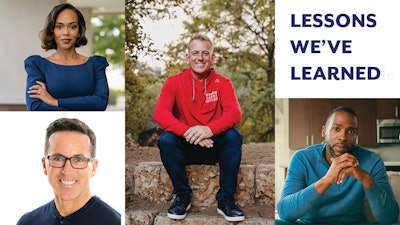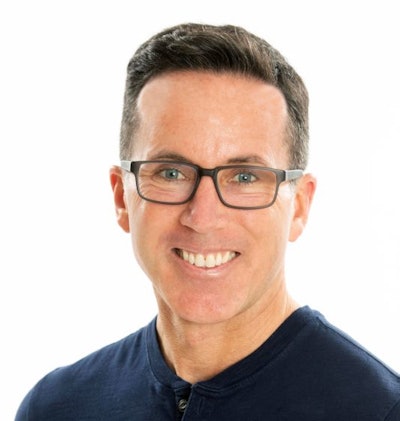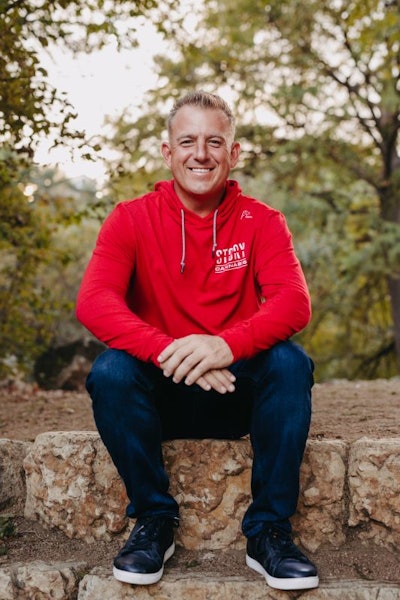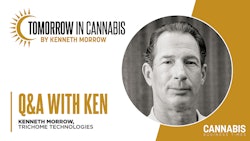
Leading a company isn’t easy in any industry. But when your business is cannabis, it’s a whole new world. Even for experienced leaders, this still-young industry comes with a learning curve—full of hurdles and yet-to-be-written rules. Lessons learned along the way help propel leaders and their businesses to success. Cannabis Business Times talked with four cannabis CEOs willing to share their top lessons learned so others in the industry can benefit.
Lessons from …
CHRISTINA BETANCOURT JOHNSON, Founder and CEO of Standard Wellness Maryland
Standard Wellness Maryland is the first African American and Latina majority-owned, vertically integrated cannabis company in the United States, and first vertically integrated social equity licensee to launch in Maryland.
 Christina Betancourt JohnsonPhoto by Teeming Visions
Christina Betancourt JohnsonPhoto by Teeming Visions
2. “Put your people first, and they’ll put your business first. Your employees are the lifeblood of your company. Respect them, listen to their ideas, and understand what they need to thrive—because when you treat them with care, they’ll treat your business the same way. Recently, I faced the tough decision to implement a furlough, right before a holiday, as a result of store opening delays. Instead of simply cutting jobs, we reduced work hours across the team as a compromise.
My HR team and I personally called each employee to explain the situation, share a clear plan, and provide resources to help them through it. It wasn’t easy, and it cost the business more in the short term, but it showed my team that I care about them as people. That respect and authenticity are now reflected in how they approach their work—with dedication and care for the company.”
3. “Every deal dies at least once before it lives. Whether it's a new partnership, a real estate contract, or a licensing agreement, I’ve learned to expect hurdles. Deals fall apart, negotiations stall, and unexpected challenges arise. But that doesn’t mean the opportunity is lost. Often, it’s a chance to rethink, reposition, or reframe. I’ve had deals that seemed completely dead come back stronger after I took a step back and approached them from a different angle. The lesson? Don’t give up too easily. Stay persistent, flexible, and creative.”
4. “Trust yourself, but stay humble enough to learn from others. As a CEO, you’re often the final decision-maker, even in areas where you’re not the subject matter expert. The key is striking a balance between trusting your instincts and relying on the expertise of others.
Humility allows you to recognize what you don’t know and seek input from your team or external advisors. At the same time, strategic business insights often stem from experience that transcends industry specifics—it’s rooted in understanding human behavior and patterns. Over time, I’ve honed my gut instinct by observing how people and situations unfold. That intuition, sharpened through experience, gives me the confidence to weigh in and make decisions with clarity and purpose.”
5. “Let your mission be your North Star. In the fast-paced cannabis industry, it’s easy to get consumed by the day-to-day grind. But as a conscious leader, I’ve found that staying rooted in our mission—providing exceptional cannabis products while fostering equity and uplifting the community—keeps everything in perspective.
Challenges will come, but the question I always ask is, “Does this align with our mission and values?” That clarity helps me prioritize what truly matters and empowers my team to act with intention. When your work is guided by purpose, it inspires everyone around you to stay committed to the bigger picture.”
Lessons from …
WILL BOWDEN, Founder and CEO of Grasshopper Farms Will BowdenCourtesy Grasshopper Farms
Will BowdenCourtesy Grasshopper Farms
6. “Embrace 2025 and build a strong foundation for business success. As we step into 2025, businesses are presented with an opportunity to fortify their operations by prioritizing sound, sustainable practices. This year invites companies to sharpen their internal processes and carefully evaluate the external partnerships they forge. With determination and a clear vision, 2025 can be a landmark year for businesses ready to seize the moment and create lasting value."
7. “Lead with discipline, clarity, and intention. It’s a time for discipline—one that requires defining not only what we will pursue but also what we consciously choose to set aside. This clarity can empower businesses to focus their energy, ensuring they operate at peak efficiency and deliver exceptional results.
The value of meeting discipline cannot be overstated in an industry brimming with opportunities. With a plethora of suppliers, partners, and services vying for attention, it’s easy for meetings to consume valuable time. Strategic scheduling and intentional decision-making in this area can protect resources and ensure that efforts remain aligned with core business goals.”
8. “Position yourself for success. Running a business is undeniably challenging, but navigating a newly emerging industry shaped by historical stigma amplifies these difficulties. Despite the hurdles, entrepreneurs who pair hard work, focus, and discipline with a foundation of robust business acumen are uniquely positioned for success. They hold the potential to not only build thriving enterprises but also to offer transformative, impactful products to the world.”
 Jason VedadiPhoto by Twinty Photography
Jason VedadiPhoto by Twinty Photography
JASON VEDADI, CEO of Story Cannabis
Founded in 2021 and headquartered in Phoenix, Ariz., Story Cannabis Company LLC is a privately held multi-state operator. Story operates two cultivation facilities and 18 retail locations across Arizona, Maryland, and Ohio.
9. Get into your market early. “It's very difficult to come into these markets as a vertically integrated operator or MSO. … You can't really come into these markets late. It's much harder. There's such an advantage to having been there from the beginning, because you get the ability to watch a market grow, and then at some point you'll get some medical-to-rec advantage that you really didn't have to pay for. You're established, and so you kind of get a big revenue bump. ... [You] need to be there early enough to see the benefit from medical to rec in order to justify spending the money in those markets.”
10. Crawl before you walk. “A lot of people come in early and they don't really have a true understanding of the complexities of operating in multiple markets. It's almost like operating two different business models, because we're not governed by one set of federal laws. If you're in 10 states or 15 states, you're governed by 10 or 15 different states. …
So, the complexity with how bifurcated the industry is, you really need to get a real good bearing on what you're getting yourself into. The thesis behind that is crawl before you walk. Pick one place, get it figured out. Don't try to take on too much at once, because really, it’s not that easy. … Just go open one store. Start your grow facility off with less square footage. Don't get yourself caught up in a spreadsheet that says, I grow this many pounds and I make this much money.
Go back and look at the history of these markets and understand them, and figure out how much cannabis does it really take the supply this market, and is the price of the product or the brand that I launch—at the time I launch it—really going to meet the pro forma modeling that you do, because these markets change and you need to understand what's going on as they're evolving.”
11. Expect surprises. “There are all these nuances that people may not understand that exist in this business because of where it is. And as it goes through this transitionary period of second prohibition, there's all these little surprises that show up that you're not used to.
You might have been a great entrepreneur in the last thing you did. … But in this one, it's like starting out in a world that just never existed ‘til about 2010. So, you might find yourself a lot more surprised on little nuances—insurance, banking, financing. … So you find that there are obstacles in the road that are unexpected and very hard to identify until it happens to you.”
12. Don’t count on reform. “People need to not count on reform in order to make their business successful. They need to build this business in a way to where they can't expect that they’re going to be able to get uplisting or that tax matters are going to change in the next 24 months. I think they really need to take a conservative approach. If they get any reform, that still works for them. When those things happen, they're just kind of a pleasant surprise and it's a bonus. But just don't count on them as a form of success.”
13. Get a good CPA and regulatory attorney. “Two things you need in a market that you’re going into: You need good tax advice. You need a really good CPA who's been through 280E. … Two, you need a good regulatory attorney that understands and can give you good advice on how to operate in that market, make sure you’re doing everything within compliance.
I think those two things are form factors that are mandatory to get yourself up and running. Without those two things, you can't really make an educated decision. So, the first two things I do if I'm going to market is make sure I have the right CPA, who is familiar with the tax situation in that state and at the federal level, and an attorney that's operated in that market as a regulatory consultant to other operators.”
Lessons from …
GIBRAN WASHINGTON, CEO of Ethos Cannabis
Ethos Cannabis is a vertically integrated MSO headquartered in Philadelphia with operations in Pennsylvania, Massachusetts, and Ohio.
 Gibran WashingtonCourtesy Ethos Cannabis
Gibran WashingtonCourtesy Ethos Cannabis
15. “Build your production facilities right the first time. Involve your operational team heavily in the process to ensure long-term success and efficiency from the start.”
16. “Raise debt in a way that aligns with your long-term goals. Ensure your financial strategy supports your growth and future vision, rather than focusing on short-term gains.”
17. “No silver bullets. There are no quick fixes in this industry. Success comes down to consistently doing things the right way, especially when it comes to people, products, and processes.”
18. “Don’t mistake passion for proficiency. Passion is important, but it’s the ability to execute that ultimately drives success.”
19. “Technology and methods evolve rapidly. Stay flexible and be prepared to pivot quickly. What works today may not work tomorrow, so adaptability is key.”
20. “Overbuilding canopy is a greed play. Greed doesn’t win in this industry. Overbuilding for the sake of expansion can lead to unnecessary losses.”
21. “Be realistic about the work. Many prospective employees romanticize the industry, but it’s hard work. Be upfront about the reality: It’s a lot of manufacturing, and success comes through persistence, not overnight wealth.”
Jolene Hansen is an award-winning freelance writer and editor specializing in the commercial horticulture, cannabis and CEA industries. Reach her at [email protected].



























